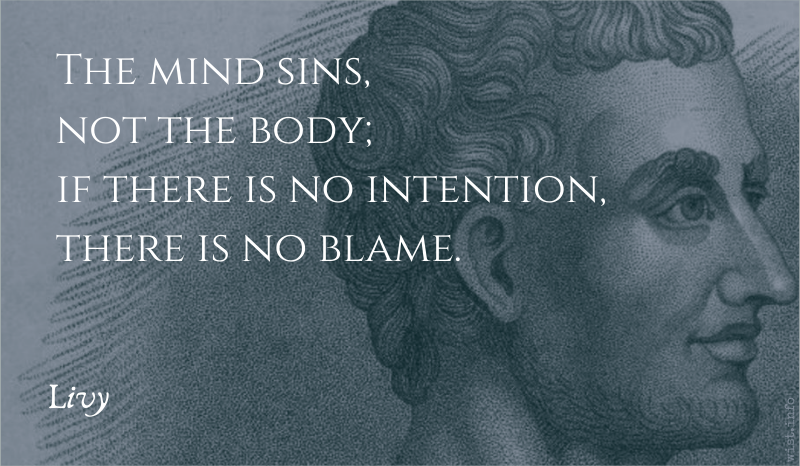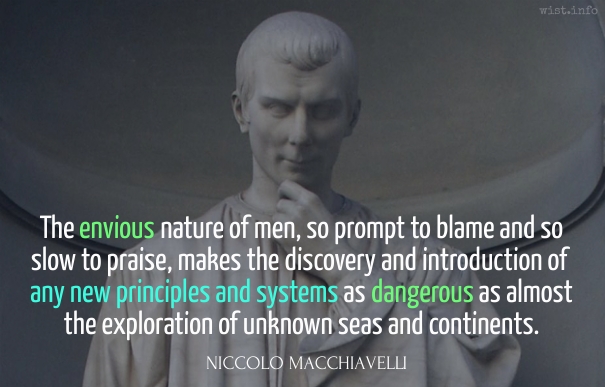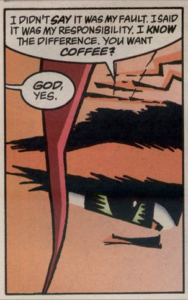What a lamentable cuss man iz, he pittys hiz nabors misfortunes, bi calling them judgments from heaven.
[What a lamentable cuss man is: he pities his neighbors’ misfortunes, by calling them judgments from heaven.]Josh Billings (1818-1885) American humorist, aphorist [pseud. of Henry Wheeler Shaw]
Everybody’s Friend, Or; Josh Billing’s Encyclopedia and Proverbial Philosophy of Wit and Humor, ch. 144 “Affurisms: Gnats” (1874)
(Source)
Quotations about:
blame
Note not all quotations have been tagged, so Search may find additional quotes on this topic.
What I have come to recognize is that just as “the black problem” turned out to be a problem of white racism, just as “the woman problem” turned out to be a problem of male sexism, so “the homosexual problem” is really the homophobia of many heterosexuals.
William Sloane Coffin, Jr. (1924-2006) American minister, social activist
The Courage to Love, ch. 5 (1982)
(Source)
A man always blames the woman who fools him. In the same way he blames the door he walks into in the dark.
H. L. Mencken (1880-1956) American writer and journalist [Henry Lewis Mencken]
A Little Book in C Major, ch. 6, § 1 (1916)
(Source)
Repeated in A Book of Burlesques, ch. 12 "The Old Subject," § 6 (1924)] and Chrestomathy, ch. 30 "Sententiae" (1949).
But we are so blind to our own shortcomings, so wide awake to those of others. Everything that happens to us is always the other person’s fault. Angelina would have gone on loving Edwin forever and ever and ever if only Edwin had not grown so strange and different. Edwin would have adored Angelina through eternity if Angelina had only remained the same as when he first adored her.
It is a cheerless hour for you both when the lamp of love has gone out and the fire of affection is not yet lit, and you have to grope about in the cold, raw dawn of life to kindle it. God grant it catches light before the day is too far spent. Many sit shivering by the dead coals till night come.Jerome K. Jerome (1859-1927) English writer, humorist [Jerome Klapka Jerome]
Idle Thoughts of an Idle Fellow, “On Being in Love” (1886)
(Source)
I certainly had not the smallest reason to fear that the execution of this murderer of Roman citizens would cause me to be blamed by posterity. And indeed, even if this were a serious danger, I have always been convinced that unpopularity earned by honourable actions is not unpopularity at all, but renown.
[Certe verendum mihi non erat, ne quid hoc parricida civium interfecto invidiae mihi in posteritatem redundaret. Quodsi ea mihi maxime inpenderet tamen hoc animo fui semper, ut invidiam virtute partam gloriam, non invidiam putarem.]Marcus Tullius Cicero (106-43 BC) Roman orator, statesman, philosopher
Orationes in Catilinam [Catilinarian Orations], No. 1, § 12, cl. 29 (1.12.29) (63-11-08 BC) [tr. Grant (1960)]
(Source)
(Source (Latin)). Alternate translations:
Truly I have no reason to fear, least this Murderer of the Citizens being slain, any envy should rise against me for the future. But if never so much did hang over me, yet I was alwayes of this Judgment, to think Envy gotten by Vertue to be no Envy but Glory.
[tr. Wase (1671)]
I could have no reason to fear; that for the execution of a traitor and a parricide I should stand condemned by the voice of posterity. But let me add, were the severest censure to be the certain consequence, it has ever been my settled opinion, that reproach, when earned by virtue, is not reproach, but the truest glory.
[tr. Sydney (1795)]
Surely I had no cause to fear lest for slaying this parricidal murderer of the citizens any unpopularity should accrue to me with posterity. And if it did threaten me to ever so great a degree, yet I have always been of the disposition to think unpopularity earned by virtue and glory, not unpopularity.
[tr. Yonge (1856)]
Surely it was not to be dreaded by me, lest, if this parricide of the citizens were slain, any odium might redound for me to posterity. But if that impended over myself in particular, yet I have always been of this opinion, that I should consider the odium acquired by merit as glory and not as odium.
[tr. Mongan (1879)]
Certainly it was not to be feared to (by) me, lest any (thing) of unpopularity might redound to me unto posterity, this parricide of citizens being slain. But if it might impend (threaten) to me mostly (very much), yet I have been always with this mind, that I might think envy produced by virtue, glory, not envy.
[tr. Underwood (1885)]
Certainly it was not to be feared by me, lest any ill-will should redound to [affect] me for posterity, this parricide of citizens having been slain. But if this should threaten me very much, yet I have been always with [of] this mind, that I should think ill will produced by virtue, glory, not ill will.
[tr. Dewey (1916)]
Certainly I did not have to fear, lest with this parricide of citizens having been killed, anything of unpopularity might run over in posterity. And yet, if these were to threaten me especially, however, I have always been in this mind, so that I thought that unpopularity obtained by virtue is an honour, not unpopularity at all.
[IB Notes]
I have always been of the opinion that infamy earned by doing what is right is not infamy at all, but glory.
[E.g.]
People complain about the bad things that happen to em that they don’t deserve but they seldom mention the good. About what they done to deserve them things. I don’t recall that I ever give the good Lord all that much cause to smile on me. But he did.
Cormac McCarthy (1933-2023) American novelist, playwright, screenwriter
No Country for Old Men, ch. 4 (2005)
(Source)
As it is, wine drove me out of my senses. I admit I wronged you, but the wrong was not intentional.
[νοϋ δ’ οίνος έξεστησέ μ’ δμολογώ δέ σε άδίκείν, τὸ δ’ αδίκημ’ ἐγένετ’ οὐχ ἑκούδίον.]
Euripides (485?-406? BC) Greek tragic dramatist
Auge [Αὐγῃ], fr. 272b (TGF) (c. 408 BC) [tr. Collard/Cropp (2008)]
(Source)
Heracles apologizing (sort of), to Auge for raping her, one of the only such apologies in ancient Greek drama.
Nauck frag. 265, Barnes frag. 6, Musgrave frag. 8. (Source (Greek)). Alternate translation:
My senses are disorder'd by the fumes
Of wine: yet will I own that I have wrong'd thee,
Tho' this be an involuntary wrong.
[tr. Wodhall (1809)]
An evil doom of some god was my undoing, and measureless wine.
[ἆσέ με δαίμονος αἶσα κακὴ καὶ ἀθέσφατος οἶνος.]
Homer (fl. 7th-8th C. BC) Greek author
The Odyssey [Ὀδύσσεια], Book 11, l. 61 (11.61) [Elpenor] (c. 700 BC) [tr. Murray (1919)]
(Source)
Odysseus first encounter in the Underworld is the shade of his comrade Elpenor, whose body had been left on Circe's island. This is Elpenor's explanation of his death (10.552-560). Drunk with his crew mates, he climbed a ladder to the roof of Circe's palace to sleep it off. When he heard his friends preparing to leave, he either fell from or forgot about using the ladder, plummeting to his ignominious death.
(Source (Greek)). Alternate translations:
In Circe’s house, the spite some spirit did bear,
And the unspeakable good liquor there,
Hath been my bane.
[tr. Chapman (1616)]
I had come along with th’ bark,
But that the Devil and excess of wine
Made me to fall, and break my neck i’ th’ dark.
[tr. Hobbes (1675), l. 54ff]
To hell my doom I owe,
Demons accursed, dire ministers of woe!
My feet, through wine unfaithful to their weight,
Betray'd me tumbling from a towery height.
[tr. Pope (1725)]
Fool’d by some dæmon and the intemp’rate bowl.
[tr. Cowper (1792), ll. 69-70]
I died
By stroke of fate and the dread fumes of wine.
[tr. Worsley (1861), st. 9]
Ill fate destroyed me, and unstinted wine!
[tr. Bigge-Wither (1869)]
An evil doom of some god was my bane, and wine out of measure.
[tr. Butcher/Lang (1879)]
God's doom and wine unstinted on me the bane hath brought.
[tr. Morris (1887)]
Heaven's cruel doom destroyed me, and excess of wine.
[tr. Palmer (1891)]
It was all bad luck, and my own unspeakable drunkenness.
[tr. Butler (1898)]
It was all bad luck of a daimôn, and my own unspeakable drunkenness.
[tr. Butler (1898), rev. Power/Nagy (1900)]
It was all bad luck of a superhuman force [daimōn], and my own unspeakable drunkenness.
[tr. Butler (1898), rev. Kim/McCray/Nagy/Power (2018)]
The harsh burden of some God sealed my doom, together with my own unspeakable excess in wine.
[tr. Lawrence (1932)]
It was the malice of some evil power that was my undoing, and all the wine I swilled before I went to sleep in Circe’s palace.
[tr. Rieu (1946)]
Bad luck shadowed me, and no kindly power;
ignoble death I drank with so much wine.
[tr. Fitzgerald (1961)]
The evil will of the spirit and the wild wine bewildered me.
[tr. Lattimore (1965)]
My undoing lay
in some god sending down my dismal fate
and in too much sweet wine.
[tr. Mandelbaum (1990)]
The doom of an angry god, and god knows how much wine --
they were my ruin, captain.
[tr. Fagles (1996)]
Bad luck and too much wine undid me.
[tr. Lombardo (2000)]
The malicious decree of some god and too much wine were my undoing.
[tr. DCH Rieu (2002)]
It was a god-sent evil destiny that ruined me, and too much wine.
[tr. Verity (2016)]
But I had bad luck from some god, and too much wine befuddled me.
[tr. Wilson (2017)]
Some god's ill-will undid me -- that, and too much wine!
[tr. Green (2018)]
Some fatal deity
has brought me down -- that and too much wine.
[tr. Johnston (2019)]
ACCOUNTABILITY, n. The mother of caution.
Ambrose Bierce (1842-1914?) American writer and journalist
“Accountability,” The Cynic’s Word Book (1906)
(Source)
Included in The Devil's Dictionary (1911).
Originally published in his "Cynic's Word Book" column in the New York American (1904-07-09) and "Cynic's Dictionary" column in the San Francisco Examiner (1904-07-17) as "the mother of remorse and great first cause of penitence."
The truth is I’ve never fooled anyone. I’ve let men sometimes fool themselves. Men sometimes didn’t bother to find out who and what I was. Instead they would invent a character for me. I wouldn’t argue with them. They were obviously loving somebody I wasn’t. When they found this out, they would blame me for disillusioning them — and fooling them.
Marilyn Monroe (1926-1962) American actress, sex symbol
My Story, ch. 24 “Another Love Affair Ends” (1974) [with Ben Hecht]
(Source)
Because
He is all-powerful, must all-good, too, follow?
I judge but by the fruits — and they are bitter —
Which I must feed on for a fault not mine.
For narcissists, setbacks are not opportunities to learn; they’re problems caused by somebody else who got in their way or sabotaged their plans.
Jeffrey Kluger (b. 1954) American journalist, author
The Narcissist Next Door, ch. 1 (2014)
(Source)
When a people are confronted with problems that are both incomprehensible and unbearable, they lash out not at those who contrived the problems but at those who expose them. When they are confronted by moral problems that they find insoluble, or perhaps intolerable, they blame the moralists. The anxieties, tensions, revulsions of our day create an atmosphere in which it is almost impossible to think clearly and dispassionately about just those problems which most imperatively require reason and objectivity — problems of adjustment to fundamental change.
Henry Steele Commager (1902-1998) American historian, writer, activist
“The University and the Community of Learning,” speech, Kent State University, Ohio (10 Apr 1971)
(Source)
I now return the Sermon you were so kind as to enclose me, having perused it with attention. The reprinting it by me, as you have proposed, would very readily be ascribed to hypocritical affectation, by those who, when they cannot blame our acts, have recourse to the expedient of imputing them to bad motives. This is a resource which can never fail them, because there is no act, however virtuous, for which ingenuity may not find some bad motive.
Thomas Jefferson (1743-1826) American political philosopher, polymath, statesman, US President (1801-09)
Letter (1903-04-19) to Edward Dowse
(Source)
The verse is mine but friend, when you declaim it,
It seems like yours, so grievously you maim it.[Quem recitas meus est, o Fidentine, libellus:
sed male cum recitas, incipit esse tuus.]Martial (AD c.39-c.103) Spanish Roman poet, satirist, epigrammatist [Marcus Valerius Martialis]
Epigrams [Epigrammata], Book 1, epigram 38 (1.38) (AD 85-86) [tr. Pott & Wright (1921)]
(Source)
"To Fidentinus." (Source (Latin)). Alternate translations:
The Booke thou readst, O Fidentine, is mine;
But when thou ill recit'st it, it proves thine.
[tr. May (1629)]
The verses, Sextus, thou dost read, are mine;
But with bad reading thou wilt make them thine.
[tr. Harington (fl. c. 1600)]
The verses, friend, which thou hast read, are mine;
But, as thou read'st them, they may pass for thine.
[tr. Bouquet]
The verses, friend, which thou hast read, are mine;
But, as thou read'st so ill, 't is surely thine.
[tr. Fletcher (c. 1650)]
My living lays were those that you dispense:
But, when you murder them, they yours commence.
[tr. Elphinston (1782), 12.14]
O Fidentinus! the book you are reciting is mine, but you recite it so badly it begins to be yours.
[tr. Amos (1858), ch. 2, ep. 33]
With faulty accents, and so vile a tone,
You quote my lines, I took them for your own.
[tr. Halhead (fl. c. 1800)]
The book which you are reading aloud is mine, Fidentinus but, while you read it so badly, it begins to be yours.
[tr. Bohn's Classical (1859)]
The verses, friend, which thou has read, are mine;
But, as though read'st them, they may pass for thine.
[tr. Bouquet (<1879)]
You're reading my book to your friends as your own:
But in reading so badly your claim to it's shown.
[tr. Nixon (1911)]
That book you recite, O Fidentinus, is mine. But your vile recitation begins to make it your own.
[tr. Ker (1919)]
The book you read in public from
is one I wrote. But the way you moan
and mangle it turns it into your own.
[tr. Bovie (1970)]
They're mine, but while a fool like you recites
My poems I resign the author's rights.
[tr. Michie (1972)]
The little book you are reciting, Fidentinus, belongs to me. But when you recite it badly, it begins to belong to you.
[tr. Shackleton Bailey (1993)]
Fame of how badly you read it endures.
Though that's my book, just call it yours.
[tr. Ericsson (1995)]
Although the lines are mine (their worth assures) --
By badly singing them, you make them yours.
[tr. Wills (2007)]
Dear Rud, the book from which you are
giving a reading is mine
but since you read so badly
it's yours.
[tr. Kennelly (2008)]
The book that you recite from, Fidentinus, is my own.
But when you read it badly, it belongs to you alone.
[tr. McLean (2014)]
That little book you're reciting is one of mine, Fidentinus; but you're reciting it so badly, it's turning into one of yours.
[tr. Nisbet (2015)]
You ask me to recite my poems to you?
I know how you’ll “recite” them, if I do.
[tr. Burch (c. 2017)]
That verse is mine, you know, which you’re
Reciting, But you quote it
So execrably, that I believe
I’ll let you say you wrote it
[tr. Wender]
The poems thou are reading, friend, are mine;
But such bad reading starts to make them thine.
[tr. Oliver]
Many of our disappointments and much of our unhappiness arise from our forming false notions of things and persons. We strangely impose upon ourselves; we create a fairyland of happiness. Fancy is fruitful and promises fair, but, like the dog in the fable, we catch at a shadow, and when we find the disappointment, we are vexed, not with ourselves, who are really the imposters, but with the poor, innocent thing or person of whom we have formed such strange ideas.
Abigail Adams (1744-1818) American correspondent, First Lady (1797-1801)
Letter to Hannah Lincoln (5 Oct 1761)
(Source)
Every group feels strong once it has found a scapegoat.
Mignon McLaughlin (1913-1983) American journalist and author
The Neurotic’s Notebook, ch. 6 (1963)
(Source)
For whoever reflects on the nature of things, the various turns of life, and the weakness of human nature, grieves, indeed, at that reflection; but while so grieving he is, above all other times, behaving as a wise man: for he gains these two things by it; one, that while he is considering the state of human nature he is performing the especial duties of philosophy, and is provided with a triple medicine against adversity: in the first place, because he has long reflected that such things might befall him, and this reflection by itself contributes much towards lessening and weakening all misfortunes; and, secondly, because he is persuaded that we should bear all the accidents which can happen to a man, with the feelings and spirit of a man; and lastly, because he considers that what is blameable is the only evil; but it is not your fault that something has happened to you which it was impossible for man to avoid.
[Neque enim qui rerum naturam, qui vitae varietatem, qui imbecillitatem generis humani cogitat, maeret, cum haec cogitat, sed tum vel maxime sapientiae fungitur munere. Utrumque enim consequitur, ut et considerandis rebus humanis proprio philosophiae fruatur officio et adversis casibus triplici consolatione sanetur: primum quod posse accidere diu cogitavit, quae cogitatio una maxime molestias omnes extenuat et diluit; deinde quod humana humane ferenda intelligit; postremo quod videt malum nullum esse nisi culpam, culpam autem nullam esse, cum id, quod ab homine non potuerit praestari, evenerit.]
Marcus Tullius Cicero (106-43 BC) Roman orator, statesman, philosopher
Tusculan Disputations [Tusculanae Disputationes], Book 3, ch. 16 (3.16) / sec. 34 (45 BC) [tr. Yonge (1853)]
(Source)
(Source (Latin)). Alternate translations:
For he that considers the order of Nature, and the Vicissitudes of Life, and the Frailty of Mankind is not melancholly when he considers these things, but is then most principally imploy'd in the exercise of Wisdom, for he reaps a double advantage; both that in the consideration of man's circumstances, he enjoyeth the proper Office of Philosophy; and in case of Adversity, he is supported by a threefold Consolation. First, that he hath long consider'd that such accidents might come; which consideration alone doth most weaken and allay all Afflictions. Then he cometh to learn, that all Tryals common to men, should be born, as such, patiently. Lastly, that he perceiveth there is no Evil, but where is blame; but there is no blame, when that falls out, the Prevention of which, was not in man to warrant.
[tr. Wase (1643)]
For whoever reflects on the nature of things, the various turns of life, the weakness of human nature, grieves indeed at that reflection; but that grief becomes him as a wise man, for he gains these two points by it; when he is considering the state of human nature he is enjoying all the advantage of philosophy, and is provided with a triple medicine against adversity. The first is, that he has long reflected that such things might befall him, which reflection alone contributes much towards lessening all misfortunes: the next is, that he is persuaded, that we should submit to the condition of human nature: the last is, that he discovers what is blameable to be the only evil. But it is not your fault that something lights on you, which it was impossible for man to avoid.
[tr. Main (1824)]
For neither does he who contemplates the nature of things, the mutations of life, the fragility of man, grieve when he thinks of these matters, but then most especially exercises the office of wisdom. For, by the study of human affairs, he at once pursues the proper aim of philosophy, and provides himself with a triple consolation for adverse events: -- first, that he has long deemed them possible to arrive; which one consideration has the greatest efficacy for the extenuation and mitigation of all misfortune: and, next, he perceives that human accidents are to be borne like a man: and, finally, because he sees there is no evil but fault, and that there is no fault where that has happened which man could not have prevented.
[tr. Otis (1839)]
Indeed, he who thinks of the nature of things, of the varying fortune of life, of the weakness of the human race, does not sorrow when these things are on his mind, but he then most truly performs the office of wisdom; for from such thought there are two consequences, -- the one, that he discharges the peculiar function of philosophy; the other, that in adversity he has the curative aid of a threefold consolation: first, because, as he has long thought what may happen, this sole thought is of the greatest power in attenuating and diluting every trouble; next, because he understands that human fortunes are to be borne in a way befitting human nature; -- lastly, because he sees that there is no evil but guilt, while there is no guilt in the happening of what man could not have prevented.
[tr. Peabody (1886)]
For the person who reflects on the nature of things, on the variety of life, and the precarity of human existence is not sad in considering these things but is carrying out the duty of wisdom in the fullest way. For they pursue both in enjoying the particular harvest of philosophy by considering what happens in human life and in suffering adverse outcomes by cleansing with a three-part solace. First, by previously accepting the possibility of misfortune—which is the most way of weakening and managing any annoyance and second, by learning that human events must be endured humanely; and third, by recognizing that there is nothing evil except for blame and there is no blame when the event is something against which no human can endure.
[tr. @sentantiq (2021)]
It is always tempting when you have political discontent in your own country to say it is the fault of some other country and not of your own government.
A. J. P. Taylor (1906-1990) British historian, journalist, broadcaster [Alan John Percivale Taylor]
How Wars Begin (1979)
(Source)
My word, how mortals take the gods to task!
All their afflictions come from us, we hear.
And what of their own failings? Greed and folly
double the suffering in the lot of man.[ὢ πόποι, οἷον δή νυ θεοὺς βροτοὶ αἰτιόωνται.
ἐξ ἡμέων γάρ φασι κάκ’ ἔμμεναι· οἱ δὲ καὶ αὐτοὶ
σφῇσιν ἀτασθαλίῃσιν ὑπὲρ μόρον ἄλγε’ ἔχουσιν.]Homer (fl. 7th-8th C. BC) Greek author
The Odyssey [Ὀδύσσεια], Book 1, l. 32ff (1.32) [Zeus] (c. 700 BC) [tr. Fitzgerald (1961)]
(Source)
Original Greek. Alternate translations:
O how falsely men
Accuse us Gods as authors of their ill!
When, by the bane their own bad lives instill,
They suffer all the mis’ries of their states,
Past our inflictions, and beyond their fates.
[tr. Chapman (1616)]
Ha! how dare mortals tax the Gods, and say,
Their harms do all proceed from our decree,
And by our setting; when by their crimes they
Against our wills make their own destiny?
[tr. Hobbes (1675), l. 37ff]
Perverse mankind! whose wills, created free,
Charge all their woes on absolute degree;
All to the dooming gods their guilt translate,
And follies are miscall'd the crimes of fate.
[tr. Pope (1725)]
Alas! how prone are human-kind to blame
The Pow’rs of Heav’n! From us, they say, proceed
The ills which they endure, yet more than Fate
Herself inflicts, by their own crimes incur.
[tr. Cowper (1792), l. 41ff]
Mortals, ye Powers, upbraid us with their voice,
And brand us for the fount of all their ill,
Who, of their own acts, not of fate but choice,
Heap to themselves much toil and sorrow still.
[tr. Worsley (1861), st. 6]
Why! what reproach,
Ye gods! do mortals cast on deities!
To us all their calamities they trace,
While they, themselves, through their own senseless acts,
Feel pangs their destiny had ne'er decreed.
[tr. Musgrave (1869)]
Oh heavens! how mortals now to blame the gods!
From us they say spring ills! but they themselves
By their own folly bring unfated woes.
[tr. Bigge-Wither (1869)]
Lo you now, how vainly mortal men do blame the gods! For of us they say comes evil, whereas they even of themselves, through the blindness of their own hearts, have sorrows beyond that which is ordained.
[tr. Butcher/Lang (1879)]
Lo, how men blame the gods! From us, they say, spring troubles. But through their own perversity and more than is their due they meet with sorrow.
[tr. Palmer (1891)]
See now, how men lay blame upon us gods for what is after all nothing but their own folly.
[tr. Butler (1898)]
Oh my, how mortals hold us gods responsible! For they say that their misfortunes come from us. But they get their sufferings, beyond what is fated, by way of their own acts of recklessness.
[tr. Butler (1898), rev. Kim/McCray/Nagy/Power (2018)]
Look you now, how ready mortals are to blame the gods. It is from us, they say, that evils come, but they even of themselves, through their own blind folly, have sorrows beyond that which is ordained.
[tr. Murray (1919)]
It vexes me to see how mean are these creatures of a day towards us Gods, when they charge against us the evils (far beyond our worst dooming) which their own exceeding wantonness has heaped upon themselves.
[tr. Lawrence (1932)]
What a lamentable thing it is that men should blame the gods and regard us as the source of their troubles, when it is their own wickedness that brings them sufferings worse than any which Destiny allots them.
[tr. Rieu (1946)]
Oh for shame, how the mortals put the blame upon us
gods, for they say evils come from us, but it is they, rather,
who by their own recklessness win sorrow beyond what is given.
[tr. Lattimore (1965)]
Men are so quick to blame the gods: they say
that we devise their misery. But they
themselves -- in their depravity -- design
grief greater than the griefs that fate assigns.
[tr. Mandelbaum (1990)]
Ah how shameless -- the way these mortals blame the gods.
From us alone, they say, come all their miseries, yes,
but they themselves, with their own reckless ways,
compound their pains beyond their proper share.
[tr. Fagles (1996)]
Mortals! They are always blaming the gods
For their troubles, when their own witlessness
Causes them more than they were destined for!
[tr. Lombardo (2000), l. 37ff]
Strange to behold, what blame these mortals can bring against godhead! For their ills, they assert, are from us, when they themselves by their mad recklessness have pain far past what is fated.
[tr. Merrill (2002)]
What a lamentable thing it is that men should blame the gods and regard us as the source of their troubles, when it is their own transgressions which bring them suffering that was not their destiny.
[tr. DCH Rieu (2002)]
This is not good! See how mortals find fault with us gods!
They say it is from us that all evil things come, yet it is by their
own recklessness that they suffer hardship beyond their destiny.
[tr. Verity (2016)]
This is absurd,
that mortals blame the gods! They say we cause
their suffering, but they themselves increase it
by folly.
[tr. Wilson (2017)]
My oh my, the way mortals will fasten blame on the gods!
From us, they say, evils come, yet they themselves
through their own blind recklessness have ills beyond
their fated lot.
[tr. Green (2018)]
It’s disgraceful how humans blame the gods.
They say their tribulations come from us,
when they themselves, through their own foolishness,
bring hardships which are not decreed by Fate.
[tr. Johnston (2019), l. 41ff]
It was so much easier to blame it on Them. It was bleakly depressing to think that They were Us. If it was Them, then nothing was anyone’s fault. If it was Us, what did that make Me? After all, I’m one of Us. I must be. I’ve certainly never thought of myself as one of Them. No one ever thinks of themselves as one of Them. We’re always one of Us. It’s Them that do the bad things.
Blaming mother is just a negative way of clinging to her still.
The mind sins, not the body; if there is no intention, there is no blame.
[Mentem peccare, non corpus, et unde consilium abfuerit, culpam abesse.]
Livy (59 BC-AD 17) Roman historian [Titus Livius]
Ab Urbe Condita [From the Founding of the City; The History of Rome], Book 1, ch. 58 (27-9 BC)
Reassurances given to Lucretia, wife of Collatinus, after her rape by Sextus Tarquin. She still kills herself.
Different sources use abfuerit or afuerit. Restated as a legal term, it's usually given as Mens peccat, non corpus, et unde consilium abfuit, culpa abest.
Alt. trans.:
- "That it is the mind sins, not the body; and that where intention was wanting guilt could not be." [tr. Spillan (1896)]
- "The mind sins, not the body, and there is no guilt when intent is absent." [tr. Luce]
- "The mind sins, not the body; and where the power of judgment has been absent, guilt is absent." [Source]
- "The mind alone was capable of sinning, not the body, and that where there was no such intention, there could be no guilt." [tr. Baker (1823)]
- "It is the mind that sins, not the body, and where there has been no consent there is no guilt." [tr. Roberts (1905)]
- "It is the mind that sins, not the body; and that where purpose has been wanting there is no guilt." [tr. Foster (1919)]
- "It is the will only that is capable of sinning, not the body; and where there is no intention, there can be no guilt." [Source]
How wonderful to have someone to blame! How wonderful to live with one’s nemesis! You may be miserable, but you feel forever in the right. You may be fragmented, but you feel absolved of all the blame for it. Take your life in your own hands, and what happens? A terrible thing: no one to blame.
It is the wit,
The policy of sin, to hate those men
We have abus’d.William Davenant (1606-1668) English poet and playwright [a.k.a. William D'Avenant]
The Just Italian, Act 3, sc. 1 [Sciolto] (1630)
(Source)
The envious nature of men, so prompt to blame and so slow to praise, makes the discovery and introduction of any new principles and systems as dangerous as almost the exploration of unknown seas and continents.
There is luxury in self-reproach. When we blame ourselves, we feel no one else has a right to blame us. It is the confession, not the priest, that gives us absolution.
Oscar Wilde (1854-1900) Irish poet, wit, dramatist
The Picture of Dorian Gray, ch. 8 (1891)
(Source)
LADY MACBETH: Whither should I fly?
I have done no harm. But I remember now
I am in this earthly world; where to do harm
Is often laudable, to do good sometime
Accounted dangerous folly.William Shakespeare (1564-1616) English dramatist and poet
Macbeth, Act 4, sc. 2, l. 81ff (4.2.81-85) (1606)
(Source)
The central belief of every moron is that he is the victim of a mysterious conspiracy against his common rights and true desserts. He ascribes all his failure to get on in the world, all of his congenital incapacity and damnfoolishness, to the machinations of werewolves assembled in Wall Street, or some other such den of infamy. If these villains could be put down, he holds, he would at once become rich, powerful and eminent. Nine politicians out of every ten, of whatever party, live and have their being by promising to perform
this putting down. In brief, they are knaves who maintain themselves by preying on the idiotic vanities and pathetic hopes of half-wits.
What is wrong then? The system. But when you’ve said that you’ve said nothing. The system, after all, is only the outcome of the human psyche, the human desires. We shout and blame the machine. But who on earth makes the machine, if we don’t? And any alterations in the system are only modifications in the machine. The system is in us, it is not something external to us. The machine is in us, or it would never come out of us. Well then, there’s nothing to blame but ourselves, and there’s nothing to change except inside ourselves.
Those see nothing but Faults that seek for nothing else.
Thomas Fuller (1654-1734) English physician, preacher, aphorist, writer
Gnomologia: Adages and Proverbs, #5021 (1732)
(Source)
Mister Marvin Middle Class is really in a stew
Wond’rin’ what the younger generation’s coming to
And the taste of his martini doesn’t please his bitter tongue
Blame it on the Rolling Stones.
Blame it on the Stones; blame it on the Stones
You’ll feel so much better, knowing you don’t stand alone
Join the accusation; save the bleeding nation
Get it off your shoulders; blame it on the Stones.
If my theory of relativity is proven successful, Germany will claim me as a German and France will declare that I am a citizen of the world. Should my theory prove untrue, France will say that I am a German and Germany will declare that I am a Jew.
RESPONSIBILITY, n. A detachable burden easily shifted to the shoulders of God, Fate, Fortune, Luck or one’s neighbor. In the days of astrology it was customary to unload it upon a star.
Ambrose Bierce (1842-1914?) American writer and journalist
“Responsibility,” The Devil’s Dictionary (1911)
(Source)
The Foreign Secretary was a quite peerless orator. No matter how low the Government stood in the estimation of everyone, when the Foreign Secretary stood up and spoke — ah! how different everything seemed then! How quickly was every bad thing discovered to be the fault of the previous administration (an evil set of men who wedded general stupidity to wickedness of purpose).
To find the cause of our ills in something outside ourselves, something specific that can be spotted and eliminated, is a diagnosis that cannot fail to appeal. To say that the cause of our troubles is not in us but in the Jews, and pass immediately to the extermination of the Jews, is a prescription likely to find a wide acceptance.
Eric Hoffer (1902-1983) American writer, philosopher, longshoreman
The Passionate State of Mind, Aphorism 126 (1955)
(Source)
We for a certainty are not the first
Have sat in taverns while the tempest hurled
Their hopeful plans to emptiness, and cursed
Whatever brute and blackguard made the world.A. E. Housman (1859-1936) English scholar and poet [Alfred Edward Housman]
“The Chestnut Casts His Flambeaux and the Flowers,” st. 3, Last Poems, # 9 (1922)
(Source)
The secret thoughts of a man run over all things holy, prophane, clean, obscene, grave, and light, without shame, or blame.
Poverty is no sinne.
George Herbert (1593-1633) Welsh priest, orator, poet.
Jacula Prudentum, or Outlandish Proverbs, Sentences, &c. (compiler), # 844 (1640 ed.)
(Source)
ROSE: I didn’t say it was my fault. I said it was my responsibility. I know the difference.
Neil Gaiman (b. 1960) British author, screenwriter, fabulist
Sandman, Book 9. The Kindly Ones, # 60 “The Kindly Ones: 4” (1994-06)
(Source)
To ignore evil is to become an accomplice to it.
Martin Luther King, Jr. (1929-1968) American clergyman, civil rights leader, social activist, preacher
Where Do We Go from Here: Chaos or Community? (1967)
(Source)
The real existence of an enemy upon whom one can foist off everything evil is an enormous relief to one’s conscience. You can then at least say, without hesitation, who the devil is; you are quite certain that the cause of your misfortune is outside, and not your own attitude.
As always, victory finds a hundred fathers, but defeat is an orphan.
[Come sempre, la victoria trova cento padri, e nessuno vuole riconoscere l’insuccesso.]
Galeazzo Ciano (1903-1944) Italian diplomat [Gian Galeazzo Ciano, 2nd Count of Cortellazzo and Buccari]
Diario, 9 Sep 1942 (1946)
(Source)
Alternate translation: "As always, victory will have a hundred fathers, but defeat will never be acknowledged by anyone at all."
An "old saying" quoted by John Kennedy after the Bay of Pigs fiasco. Most likely gleaned from the movie The Desert Fox (1951), where Field Marshal von Rundstedt tells Erwin Rommel “You must never forget this, my dear fellow: Victory has a hundred fathers. Defeat is an orphan.” The movie was based on the book Desmond Young, Rommel, the Desert Fox (1951), which provides a citation for the quotation.
One of the annoying things about believing in free will and individual responsibility is the difficulty in finding someone to blame your troubles on. And when you do find someone, it’s remarkable how often their picture turns up on your driver’s license.





















































